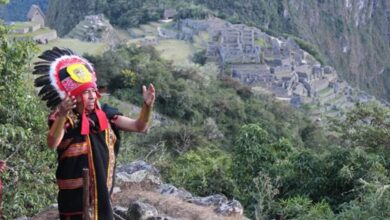This Weekend, Armed Forces Carried Out A Coup Against President Alpha Condé. What Is Happening In the African Country?.

Last Sunday, the Guinea Special Forces, under the command of Lieutenant Colonel Mamady Doumbouya, appeared in a video broadcast by international media with President Alpha Condé in their power. Photo: EFE
LatinAmerican Post | Santiago Gómez Hernández
Listen to this article
Leer en español: 5 puntos para entender lo que está pasando en Guinea-Conakry
Guinea (also known as Guinea-Conakry to differentiate it from its homonymous neighbors) is a small country located in West Africa. Since this weekend, it has been going through a coup that has put the international community on alert.
Last Sunday, the Special Forces of Guinea, under the command of Lieutenant Colonel Mamady Doumbouya, appeared in a video broadcast by international media with President Alpha Condé in their power. The forces reported that they were suspending the constitution, the institutions were being dissolved, and the country's land and air borders were being closed (a measure that was short-lived since reopening was ordered a day later).
But what is known so far about what is happening in Guinea? Here are 5 keys to understand the panorama.
1. Was there a coup or not?
Despite what was communicated at the time by Condé's defense minister and an attempt by forces loyal to the executive to defend the president , the country has already fallen into the hands of the military. The borders have been opened under orders from Doumbouya and he himself has met with the former members of the Condé administration.
Golpe de Estado en Guinea Conakry
Efectivos militares del Grupo de Fuerzas Especiales del Ejército de ese país, toman el poder y arrestan al presidente
Habitantes en las calles celebran la detención de Alpha Condé, quien ejercía la presidencia de Guinea desde 2010 pic.twitter.com/liBoSCo6pi
— Rocío San Miguel (@rociosanmiguel) September 5, 2021
On Sunday shots were heard in the center of Conakry where the presidential palace and other important public institutions are located.
2. Who is the captured president?
Alpha Condé may be known as the father of democracy in Guinea, or as the man in charge of ending it. The ousted president had held power in Guinea since December 21, 2010, when he won the first elections in the country.
De la alfombra roja con Merkel a un sofá detenido por soldados golpistas. Una semana de diferencia entre las dos imágenes.
Via @VOAAfrica pic.twitter.com/m2SpaQgqh3
— Xavier Aldekoa (@xavieraldekoa) September 6, 2021
However, his figure as a Democrat was diluted as he was winning re-elections. After the last elections (2020), in which Condé obtained 59.49% of the votes, his adversary, Cellou Dalein Diallo, did not know the results. This ended in clashes between the opposition and military forces.
For his last reelection, Alpha Condé modified the constitution, which generated a climate of greater rejection among his opponents.
3. Why the political crisis?
Guinea-Conakry has been going through various problems since its founding. In 2014, it was one of the focus countries of the Ebola epidemic, causing 2,543 deaths, only behind Sierra Leone and Liberia.
But in addition to the possible economic and health crises, the wounds opened in the last elections never healed. Previously, the constitution of Guinea allowed 2 consecutive terms. However, Condé (elected in 2010 and 2015) wanted to modify that article, but the strategy was not endorsed in a referendum. However, the president interpreted that having ratified the constitutional article, his previous terms were annulled and he could once again aspire for 10 years.
Also read: How Is the Jihad Going? These Are the Remaining Islamist Groups
This move generated many protests from the opposition and at the time of the elections, there were allegations of fraud, which sparked pockets of protests (violently repressed by the Armed Forces) throughout the country.
4. Weak political stability
This is not the first time that military forces have attempted a coup in this nation. In 2011, after the death of former president Lansana Conté and the election of Alpha Condé, a group of soldiers who tried to take power by force, was repelled by the Condé presidential guard.
5. What comes next?
The first decision of the Grouping and Development Committee (the military junta currently in power) was to create a government of national unity that will serve as a transit point to new elections. However, Doumbouya, at the head of the new government, did not specify how long this period will last.
The coup plotters have tried to send a message of calm to the international community. They have asked for their understanding, given the wave of rejections that African, European and United States countries have expressed.
Likewise, the Committee tried to calm foreign investors and promised that the country would comply with its obligations. Likewise, it tried to calm the markets, with Guinea being one of the main exporters of bauxite, a necessary element for the production of aluminum.




